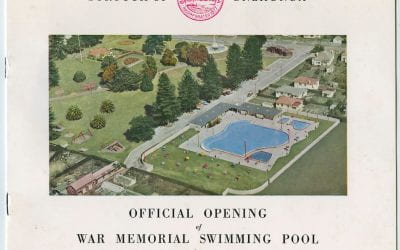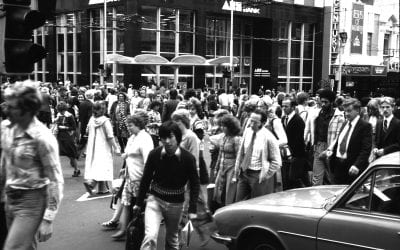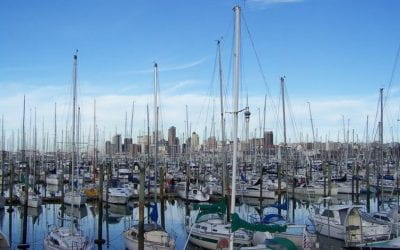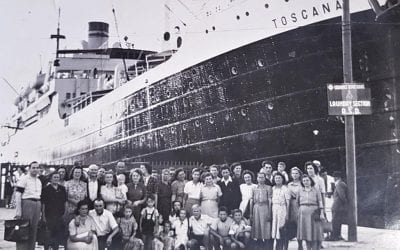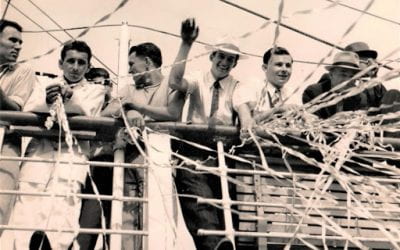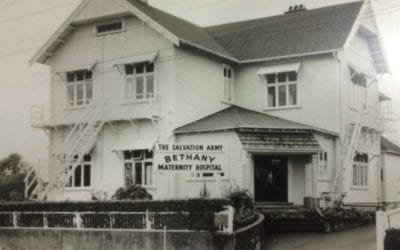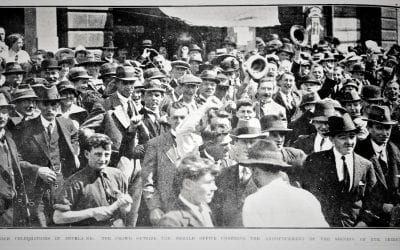
Our Stories
AHI is committed to providing a platform to present exciting new research into Auckland’s past. Contributions come from students and staff at the University of Auckland, academics from other New Zealand Universities and Institutions as well as professional historians.
The AHI also showcases recent research at an annual Symposium. To find out more and watch a selection of presentations from the 2019 AHI Symposium see AHI Events.
Sacrifice, duty and blue space in Onehunga: exploring a mid-20th century memorial swimscape
by Gretel Boswijk*
The outdoor swimming season has come to an end (except for those hardy folk who sea swim all year round) and ANZAC day 2022 has just passed by, with ceremonies held at war memorials around the country. What is the link between these two points? In the 20th century, and particularly after World War II (WWII), at least 16 swimming pools were constructed or vested with a memorial purpose often signified by entrance gates bearing a roll of honour or inscription.
Queen Street’s Nine Lives
by Nancy Mitchelson*
In a paper presented to the Rotary Club of Auckland in 1978, the city’s then Deputy Mayor J.R Firth laid out what he saw as the two primary issues dominating the minds of Council and its ratepayers. The first being the ubiquitous issue of rates, the second being a more recent proposal to pedestrianise Queen Street.
Local History: Making Places Matter
*Lucy Mackintosh Local, or place-based history, is often dismissed by academic historians as lacking an ‘analytical edge’, or as presenting places as fixed, stable entities that do not relate to national questions. But by relegating local narratives to a field outside...
What’s in a name? Calling Auckland through time
by Linda Bryder* In July 2021 I was invited to speak at an urban history symposium in Palmerston North about the history of ‘Auckland: The Big Smoke’. Auckland has always been my home; my parents arrived in Auckland in 1950 as Danish immigrants, after a brief...
Leaving home and coming home
by Slavenka Misa (nee Sumich)
Belonging, identity and citizenship were in a flux. Dalmatian New Zealanders began to apply to return to New Zealand before the end of 1948; disillusioned with Yugoslavia they were keen to return ‘home’. Some returnees, desperate and despairing of obtaining official permission and papers for their departure tried to flee over the Italian border.
Experiencing Yugoslavia
by Slavenka Misa (nee Sumich)
The returnees understood that they were going to a war damaged land but articles in the Napredak newspaper had filled them with optimism that reconstruction and social and economic progress was forging ahead. They expected to tighten their belts for a while then afterwards to thrive in the promised utopia.
The Voyage
by Slavenka Misa*
The two Yugoslav ships that carried out the repatriation voyages were bought with the express purpose of repatriating young fit Yugoslavs living overseas.
Help where help was needed – Single Mothers and the Salvation Army Bethany Home in 1960s-70s Auckland
By Ione Cussen*
The Salvation Army Bethany Home in Auckland was a much-loved and well-utilised private maternity hospital and home for single mothers. Running from 1897 until 2011, Auckland Bethany was one of seven Bethany Homes that operated throughout the country. These homes witnessed over a century’s worth of developments in women’s rights, sexual health, birth, and parenthood.
The Repatriation Voyages of the Radnik and the Partizanka Auckland to Yugoslavia 1948 and 1949
by Slavenka Misa (nee Sumich)
These four articles explore the reasons 150 Dalmatians travelled to Yugoslavia from New Zealand in 1948 and 1949 to rebuild the country for Tito. They left New Zealand full of patriotic ideals but almost all returned disillusioned with the political system in Yugolsavia and a longing to return to a country which had become ‘home’.
Lest we forget: ANZAC Day
by Linda Bryder* While we rightly pause to commemorate the 16,500 plus New Zealanders who lost their lives in the First World War, let’s not forget those who survived the war only to succumb to a global viral infection during the last three months of 1918, just as the...

